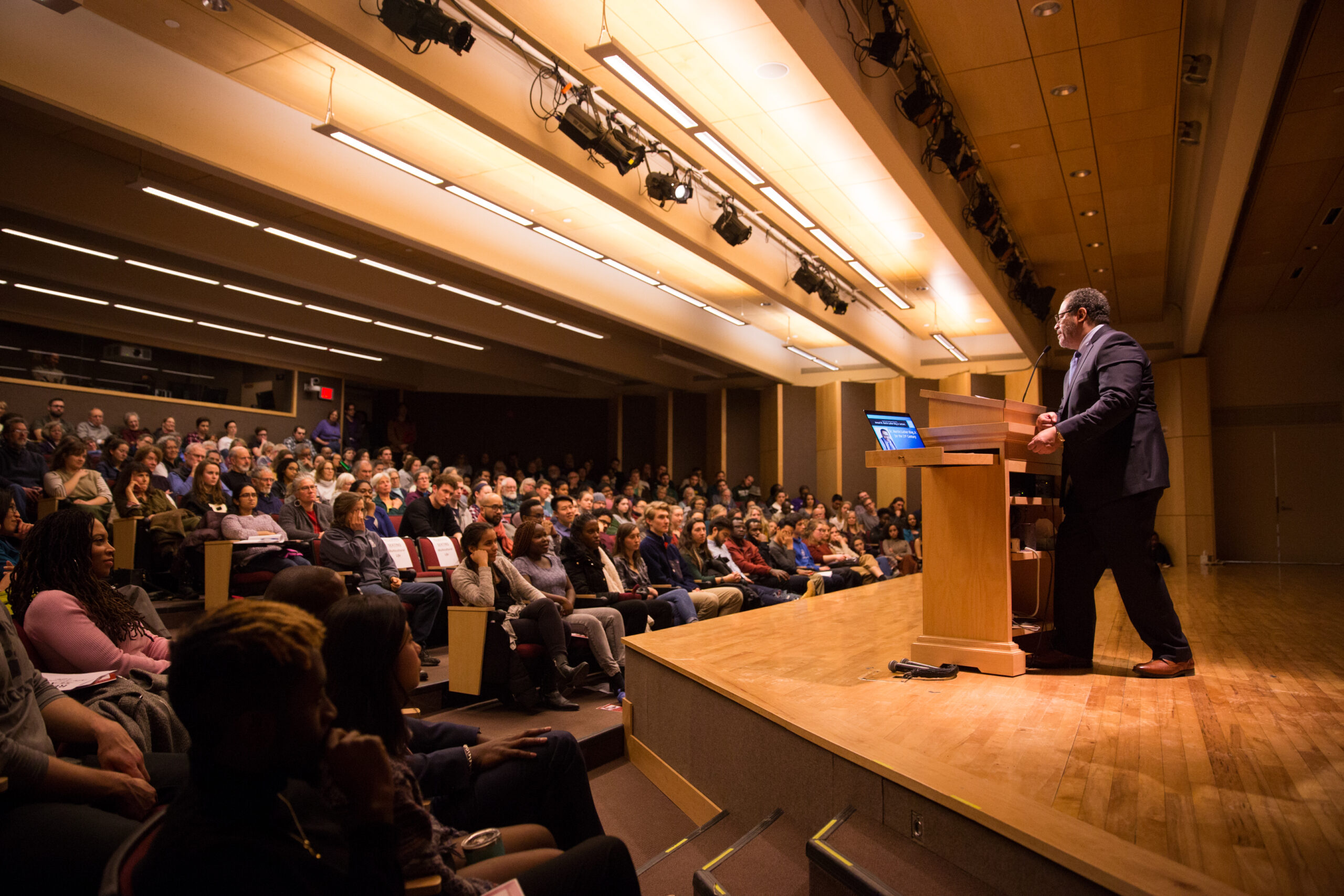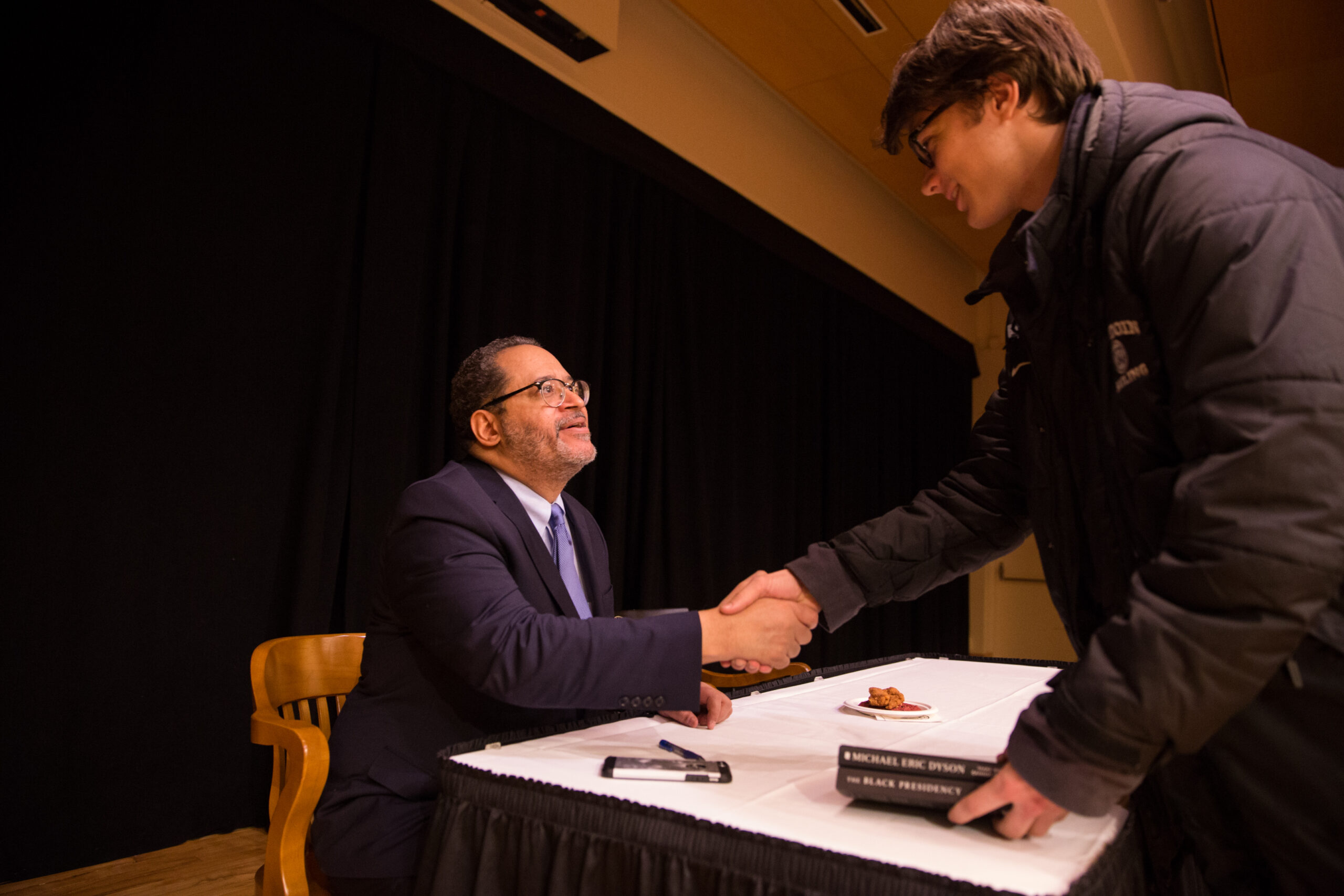MLK to #MeToo: Michael Eric Dyson talks, raps and inspires conversation on race
February 9, 2018
 Ann Basu
Ann BasuProlific author and sociologist, Baptist minister, rap and pop culture connoisseur and dynamic storyteller, Dr. Michael Eric Dyson packed Kresge Auditorium on Tuesday to deliver the annual Dr. Martin Luther King Jr. Lecture.
Dyson’s talk, titled “MLK for the 21st Century,” set out to imagine King’s vision in the context of contemporary issues such as police violence, sexism, homophobia and patriarchal power, sexual violence and the #MeToo movement.
Dyson, who teaches at Georgetown University, centered his message around a quote from King’s final speech.
“‘All I ask America, is be true to what you said on paper,’” Dyson said, quoting King.
“If you said it, live it. Let America really be America. If you talk about independence, let everyone experience it. If you talk about justice, let everybody have it,” he added.
Weaving in and out of a narrative detailing and quoting from the speech King gave the night before he was killed, the lecture addressed the work left to do to fulfill King’s vision. Eliminating racism, Dyson argued, was only the first step.
The event opened with a singing of “Lift Every Voice and Song,” led by Osa Fasehun ’18 and Alana Morrison ’20 and Dyson was introduced by Director of the Student Center for Multicultural Life Benjamin Harris, who knew Dyson previously. A testament to significant interest in the event, guests who couldn’t find seating in Kresge watched a livestream from elsewhere in the Visual Arts Center.
At times delivered with a preacher’s bellowing intensity and at times conversational and irreverent, Dyson was full of sarcasm, with performative elements such as changes in cadence, tone and tenor. He illustrated his points with pop culture references, voice imitations and recitations of poetry and rap lyrics as well as numerous references to moments of historical amnesia such as the Christian religious motivations behind the 16th Street Baptist Church bombing in 1963.
“Four girls blown to their heavenly reward in a church—an act of naked terror. That was not Mohammed, that was Bubba. This was a cross burning,” he bellowed. “Not a crescent and a sun, this is Christian terror that we rarely take measure of.”
A central theme in Dyson’s speech was the power of whiteness; in particular, its ability to distort both conceptions of the self and collective understanding of American history.
He laid out the importance of this endeavour early on with reference to NFL player Colin Kaepernick’s protest and a segment that transitioned seamlessly into spoken word poetry.
“Colin Kaepernick takes a knee—seen as an American enemy. Oh, you can beat a woman and play ball. You can rape her and start on Sunday. But God forbid you challenge the hegemony of whiteness / the unconscious privilege that whiteness brings / even saying the word witness / that makes even now your blood rise a little bit / your consciousness heighten, your awareness of your whiteness even more acute / and wondering, should you acknowledge as I speak it and how it makes you feel called out / even without intending to and then you wonder, what the black people think every day.”
Challenging the racial hierarchy inherent in American identity was at the heart of what King did, Dyson argued, because the very understanding of being black in America can only be explained by the “whiteness that calls blackness into existence.”
While some liberals may have been surprised by President Trump’s ascendency, in Dyson’s eyes, he is the logical product of white hegemony.
“Donald Trump is the fleshly thesaurus of the multiple definitions we can generate when we talk about white supremacy, white privilege, white innocence, narcissism,” he said. “What Donald Trump is doing to y’all is what y’all, collectively—whiteness—has done to us for 300 years. That’s why it ain’t no surprise. Donald Trump ain’t no wild card.”
 Ann Basu
Ann BasuAnd according to Dyson, Trump exploited his predecessor’s inability to engage in a conversation about race with white Americans by making xenophobia a centerpiece of his campaign and riding barely veiled racism to the presidency.
“Obama was always playing nice with white folk because he could never afford to tell white people the truth—and what happens when you can’t afford to tell white people the truth?” he asked. “Somebody who claims to be telling the truth will come along and take that job. You’re afraid to talk about race … he talks about it nonstop. It’s not that race is not going to be discussed, its ‘who’s gonna discuss it?’”
As much as whiteness ran through the lecture, so too did lifting up women and challenging misogyny and homophobia. Dyson grappled with one of the biggest social shifts in the last two decades—the gay rights movement—and imagined King, who he acknowledged was a prototypical patriarch and likely homophobic, would have embraced this priority.
“And then finally, if we are going to make America America for those who are locked out. How are we not going to talk about women in this moment?” he said.
In a poignant anecdote about Thomas Jefferson’s sexual relationship and children with Sally Hemmings, Jefferson’s then 14-year-old slave, Dyson hit on the intersection between patriarchal and racial power.
“It’s interesting to me that so many white people were shocked by this. Really though, très interestant. I don’t know if you notice or not but that’s just how it went down. For the most parts. Was that an exception? White man having unlimited access to the erotic potential of black women?”
“#MeToo, got some ancient roots,” he said.
He concluded with a powerful statement about the importance and power of women, drawing from Harriet Tubman.
“Women of color, black women in particular, are still dragging us to freedom today,” he said. “If King’s dream will be fulfilled, it will be in part, because they have drug us there, not only against our wills but to the best advantage of our destinies.”
Jill Tian contributed to this report.

Comments
Before submitting a comment, please review our comment policy. Some key points from the policy: